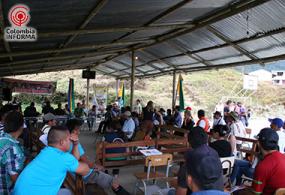On August 27, 2014, the Caravan for the Defense of Territory in Nariño presented a preliminary report to local authorities and medias in Nariño’s capital city of Pasto. The Caravan, comprised of over 20 Colombian and international organizations, travelled for 7 days in different small towns and villages in the south of Nariño through the municipalities of Samaniego and Tuquerres. The communities in Samaniego and Tuquerres live under heavy militarization due to the presence of armed actors and the interests of mining multinationals like AngloGold Ashanti. The heavy militarization has made these communities victims to extrajudicial violence, forced displacement, arbitrary detentions, harassment, and denial to basic human rights.
The objective of Caravan was to systematize the collection of denouncements and testimonies as well as visibilize the difficult situations of these communities nationally and internationally to help break the isolation and fear in these areas. Throughout the course of the 7 day trip, the Caravan facilitated spaces for the recollection of these accounts such as public forums, community visits, as well as private settings for folks who did not feel comfortable testifying in public or had sensitive testimonies The testimonies and denouncements of the violations of International Humanitarian Law and human rights were used at the end of the caravan to compose the report presented to authorities and media. The Caravan was able to collect over 116 cases on a wide variety of themes, however one central troubling theme was impunity. Amongst the 116 cases, 44.8% had been brought to the attention of the authorities as an official denouncement and of these institutionally denounced cases only 1.9% of them have been judged. With a follow-through rate so low, it is not surprising that attempted to file official denouncements to government institutions.
One of the issues which left an impression on the Caravan was the prevalence of landmines in the mountainous region of Samaniego. Land mines are used as a tool by the various armed actors within the conflict, however the civilian population remains the most impacted by the use of landmines. In 2013, there were a reported 737 deaths caused by landmines in Nariño, and additionally the presence of landmines in the region limits the freedom of mobility of the people living there. The only test community members have to verify whether an area is safe or not is whether or not their animals can walk there safely. Many people in the communities visited by the caravan shared stories their own experiences with land mines or of their family members.
In addition to the issue of landmines, the report touched on the impacts of mega-mining and the cultivation of plants for illicit use and how the presence of these industries have increased the militarization in the region. The report also presented cases of sexual abuse, criminalization of protest, illegal detentions, the use of torture, and violations of international humanitarian law established by Geneva accords.
The caravan left the territory of Nariño with a hope that the report and its publicized presentation will be able to make some impact on these at-risk communities, and also with a strong commitment to the land and the people fighting for it.
Participating organizations in the carvana included La Red de Hermandad y Solidaridad con Colombia - REDHER, El Comité de Derechos Humanos del sector montañoso de Samaniego , El comité Permanente por la Defensa de los Derechos Humanos CPDH-Nariño, La Fundación del Suroccidente y Macizo Colombiano – Fundesuma, El Comité de integración del Macizo colombiano - CIMA, El Coordinador Nacional Agrario - CNA , La Corporación Servicios Profesionales Comunitarios “SEMBRAR”, El Comité de Integración Social de Catatumbo - CISCA, La Federación agro-minera del Sur de Bolívar FEDEAGROMISBOL, Las Organizaciones Sociales y Populares del Centro Oriente de Colombia, La Corporación Avre, El Congreso de los Pueblos , La Red Europea y Americana de Hermandad y Solidaridad con Colombia, El Proyecto de Acompañamiento y Solidaridad con Colombia (PASC, Canada), La Taula Catalana por la Paz y los Derechos Humanos en Colombia (Cataluña), El Komite Internazionalistak (Basque Country), El Centro de Documentación y Solidaridad con América Latina y África-CEDSALA (Valencia), Kolumbien Kampagne (Germany), and El Llamamiento de Ginebra.
